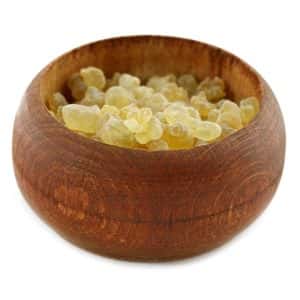
People with arthritis are caught between a rock and a hard place. If they find a medication that alleviates pain, they may discover that it has unacceptable side effects. Popular NSAIDs like ibuprofen and naproxen, for example, raise blood pressure and increase the risk of cardiovascular complications. They also irritate the digestive tract and can cause ulcers. No wonder people can get excited when they learn that boswellia fights pain!
Boswellia Effects and Side Effects:
Q. I take a number of medications for arthritis. I have had a hip replacement and a shoulder replacement and I am fighting to keep my left knee. I take Nexium and Celebrex plus other meds.
A few months ago I read an article about boswellia and decided to give it a try. I can’t tell you how wonderful this was. I had no pain!
Then I started to have a bad throat irritation. I went to the ENT, who told me that I was OK, to try a gastro. My gastro did an endoscopy, and couldn’t find a thing (except for an irritated throat), but diagnosed me with gastritis and told me to take an antacid as well as the Nexium.
I started to play with my meds, eliminating one at a time to check for side effects. Boswellia was the culprit, much to my dismay. I have been without the boswellia for about 10 days. My throat discomfort has almost gone, but the joint pain is back. I have tried gin-soaked raisins, pineapple, and vinegar, but boswellia fights pain better than any other remedy for me. Is there a way I could continue to take it without feeling sick?
The Straight and Skinny on Boswellia:
A. The Indian herb Boswellia has anti-inflammatory activity but can cause heartburn for some. This may account for your throat irritation. You probably won’t be able to take it without suffering, though the esomeprazole (Nexium) should have helped a bit in counteracting the discomfort.
If you have ever read the Bible, you know a bit more about boswellia than you think. The resin from this plant is frankincense. It was considered so valuable it was part of the gifts of the Magi (the “three wise men”), which also included myrrh and gold.
The boswellia that you will find in health food stores is known as Indian frankincense or Boswellia serrata. Ayurvedic medical practitioners have used various parts of the boswellia plant to treat a variety of conditions including asthma, dysentery, osteoarthritis, ulcers and skin problems.
Boswellia for arthritis:
The independent and highly regarded Cochrane Database of Systematic Reviews analyzed the data on boswellia for osteoarthritis. Here is the bottom line:
“Five studies of three different extracts from Boswellia serrata were included. High-quality evidence from two studies (85 participants) indicated that 90 days treatment with 100 mg of enriched Boswellia serrata extract improved symptoms compared to placebo…The studies reported no serious adverse events.”
A review of the data from numerous clinical trials in the journal BMJ (online, Dec. 17, 2008) also concluded:
“Collectively, these data seem to indicate that B serrata extracts are effective in treating a range of conditions caused or maintained by inflammatory processes.”
When this overview was published, however, the authors concluded that more research was necessary before assuming that boswellia would be clinically effective.
A small Italian study found that boswellia extract (FlexiQule) was effective in reducing pain, stiffness and improving walking distance without pain (Minerva Gastroenterologica e Diatelogica, online, Oct 22, 2015).
Combinations Containing Boswellia:
A formulation that combined curcumin (the active ingredient in turmeric) and boswellia [CB] was compared to the nonsteroidal anti-inflammatory drug (NSAID) celecoxib (Celebrex). In this small study published in Molecular Medicine Reports (Nov., 2013) the authors concluded:
“The treatment was well tolerated and did not produce any adverse effect in patients, as judged by the vital signs, hemogram, liver and renal function tests. The CB [curcumin-boswellia] formulation at 500 mg administered twice a day, was more successful than administering celecoxib 100 mg twice a day for symptom scoring and clinical examination. The formulation was found to be safe and no dose-related toxicity was found.”
Another study of 54 people with osteoarthritis had no comparative arm, so cannot be considered scientifically strong. The investigators found, however, that a combination (Movardol) of ginger, Boswellia serrata and n-acetylglucosamine improved function and pain-free walking distance (Bolognesi et al, European Review of Medical and Pharmacological Sciences, Dec. 2016). As in other studies, they reported that these herbs are safe and that the subjects had no major complaints.
Boswellia Side Effects:
As you discovered, however, boswellia may trigger side effects. This compound may cause reflux and symptoms of heartburn. Some people lose their appetite as a result.
There is one case in the medical literature of a woman who ended up with a bezoar in her stomach. This is like a hair ball in a cat. Fiber and other material accumulate within the stomach or small intestine. She also had celiac disease, so it is hard to determine how likely this complication might be for those without celiac disease.
Boswellia should not be used during pregnancy. It may also interact with some prescription drugs.
Alternatives to Fight Pain:
Since you cannot tolerate boswellia, even though it was so helpful against arthritis symptoms, we would like to suggest our book, The People’s Pharmacy Quick & Handy Home Remedies. In addition to boswellia, we discuss how people use bee stings to soothe painful joints. Cayenne, Certo and grape juice, cherries and turmeric all have anti-inflammatory benefits. Vitamin D, fish oil, gin-soaked raisins, pineapple juice, honey and vinegar or soap (yes, soap!) are other alternatives that can fight pain and probably won’t cause you heartburn.
If you prefer an online resource, consider our Guide to Alternatives for Arthritis. It devotes more than 50 pages to the pros and cons of various treatments for joint pain.
Revised 6/22/2017

